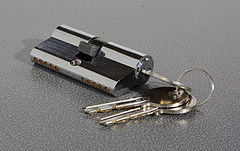Euro Profile: Difference between revisions
(Expanded! People with better knowledge of the variety of these things should continue editing this. *hint hint*) |
|||
| Line 26: | Line 26: | ||
<div align="center"><gallery> | <div align="center"><gallery> | ||
File:Euro_profile_cylinder_assembled.jpg|A | File:Euro_profile_cylinder_assembled.jpg|A Euro Profile cylinder mounted on a low-security indoor lock box. | ||
</gallery></div> | </gallery></div> | ||
Revision as of 21:37, 26 October 2010
Euro Profile
| Euro profile | |
 | |
| Name | Euro profile |
|---|---|
| Lock Type | Cylinder |
European profile (or Euro profile) is a type of cylinder design predominately used in Europe. Unlike traditional mortise and rim cylinders, the Euro profile uses a single piece of metal to connect both sides of the lock. A single cam component is placed between the two sides of the lock and is directly connected to both plugs. The Euro profile is convenient to install and replace, but it has some serious security shortcomings that must be taken into consideration. See Euro Profile (Vulnerabilities) for additional information.
Principles of operation
The Euro profile has several unique characteristics when compared with other cylinder designs. In particular, many designs only allow one side to engage the cam at any given time. This allows the owner of a double sided Euro profile lock to insert a key on the inner side to engage the cam and prevent it from being opened with a key on the outer side.
Disassembly instructions
Add to me!
Vulnerabilities
The design of the Euro Profile cylinder leaves it vulnerable to a number of attacks. The placement of the cam in the center of the cylinder leave it especially vulnerable to destructive attacks, particularly prying and pulling.
Gallery
See also
| This article is a stub. You can help Lockwiki by expanding it. |

